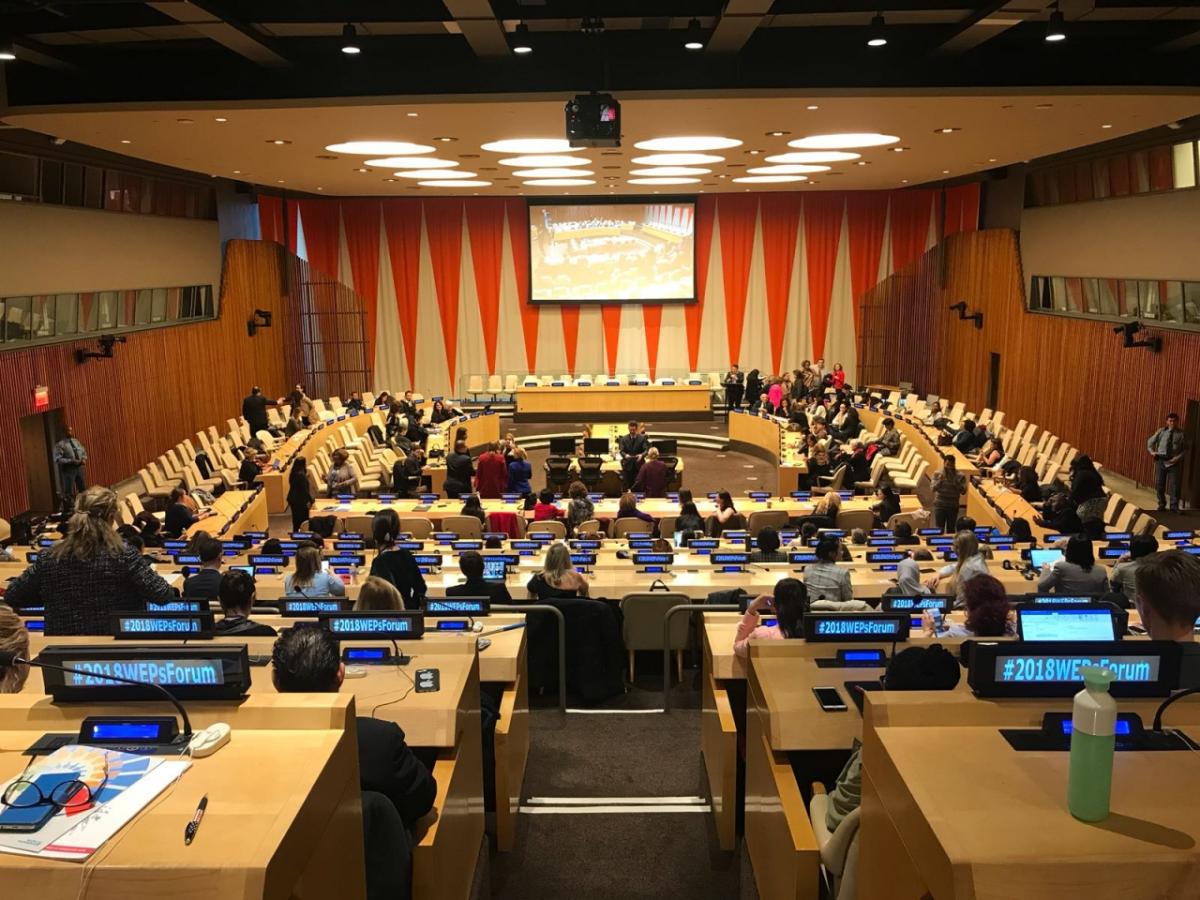Global Trends Report on the Women’s Empowerment Principles Gender Gap Analysis Tool Launched by UN Global Compact, UN Women and IDB Invest at 2018 WEPs Forum

Global Trends Report on the Women’s Empowerment Principles Gender Gap Analysis …
NEW YORK, March 15, 2018 /3BL Media/ — Unleashing the full potential of women and girls by empowering them to be equal members of society has a multiplier effect on families, businesses, communities, and nations and is essential to achieving sustainable development. Today, in the spirit of advancing the crucial role of the private sector in achieving Goal 5: Gender Equality, the United Nations Global Compact, UN Women and the United Nations Office for Partnerships (UNOP) joined forces to organize the 2018 Women’s Empowerment Principles (WEPs) Annual Forum — the premier event on gender equality for the private sector held each March as part of the annual session of the United Nations Commission on the Status of Women (CSW).
The WEPs Forum was attended by nearly 500 high-level speakers, experts and champions for gender equality and women’s empowerment within the private sector, as well as Governments, civil society and the UN. The Forum also provided a platform for presenting ongoing, successful business initiatives that aim to advance women’s empowerment, economic inclusion and entrepreneurship globally.
In her welcome remarks, Amina J. Mohammed, Deputy Secretary-General of the United Nations, noted, “gender equality is both an objective and a driver of sustainable development, and [business] is really keen on achieving not only Goal 5 on gender equality, but all the Sustainable Development Goals.” Speaking to the role of the finance community, she added, “We must close the financing gap — without adequate resources, many of the essential services upon which women and girls depend will remain unavailable. But we also need to think of innovative ways to make funding work harder for us, whether it is micro financing, crowdfunding or strong partnerships with the private sector and international financial institutions.”
To move the needle forward on gender equality, in 2017, the UN Global Compact together with UN Women and IDB Invest launched the WEPs Gender Gap Analysis Tool (WEPs Tool). The WEPs Tool is an online platform that helps global business leaders identify strengths, gaps and opportunities to improve gender equality and women’s empowerment in the workplace and within the markets and communities they serve. At this year’s Forum, the first Global Trends Report on the WEPs Tool was released by the partners, highlighting key findings from the first 100 companies that took the self-assessment tool.
Lise Kingo, CEO & Executive Director of the UN Global Compact shared high-level results from the Global Trends Report with participants during the Forum, saying “from the first 100 companies, the average at the moment is 26%. So the average shows that many businesses are past the ‘beginner’ stage, but still very much in the ‘needs improvement’ area. And where we see the highest scores among companies is that 69% have a leadership commitment in place, which is a good start, but now that hard word begins.” She continued: “The WEPs must put the focus for companies on advancing gender equality from the boardroom to the factory floor.”
Ms. Kingo’s remarks were given as part of a fireside chat-style conversation with Phumzile Mlambo-Ngcuka, Executive Director of UN Women and BBC World’s Laura Trevelyan. “We are excited to work with all stakeholders to engage businesses in signing, implementing and publicly reporting on the WEPs. Together with the UN Global Compact, we hope that these corporations will lead by example and engage women more strategically in core business operations, governance structures and corporate value chains,” said Ms. Phumzile.
This year’s Forum, held in conjunction with the 62nd CSW, showcased new actions from the private sector in fast-tracking women’s equal participation in the workforce. Representatives from business shared their personal experience as women entrepreneurs and leaders, and led discussions on how business can help ensure women’s access to finance and empowerment across the value chain.
###
About the Women's Empowerment Principles
The Women’s Empowerment Principles (WEPs) — a joint initiative between the UN Global Compact and UN Women — provides companies with an integrated and approach to invoke transformative change for women in business and society. The WEPs provide a proven framework for business to advance women’s empowerment and elaborate the gender dimension of corporate sustainability. To date, nearly 1,900 business leaders have endorsed the WEPs, signaling their support for equality between men and women and the guidance provided by the Principles.
About the United Nations Global Compact
The United Nations Global Compact is a call to companies everywhere to align their operations and strategies with ten universally accepted principles in the areas of human rights, labour, environment and anti-corruption, and to take action in support of UN goals and issues embodied in the Sustainable Development Goals. The UN Global Compact is a leadership platform for the development, implementation and disclosure of responsible corporate practices. Launched in 2000, it is the largest corporate sustainability initiative in the world, with more than 9,500 companies and 3,000 non-business signatories based in over 160 countries, and more than 70 Local Networks.
For more information, follow @globalcompact and visit www.unglobalcompact.org.
About UN Women
UN Women is the UN organization dedicated to gender equality and the empowerment of women. A global champion for women and girls, UN Women was established to accelerate progress on meeting their needs worldwide. UN Women supports UN Member States as they set global standards for achieving gender equality, and works with governments and civil society to design laws, policies, programmes and services needed to implement these standards. UN Women also coordinates and promotes the UN system’s work in advancing gender equality.
unwomen.org

